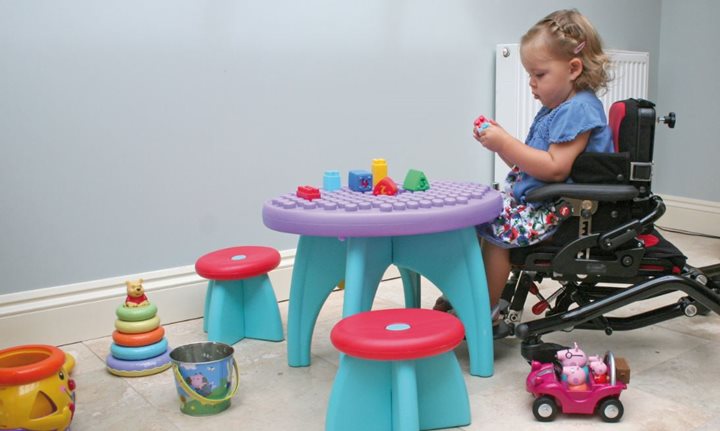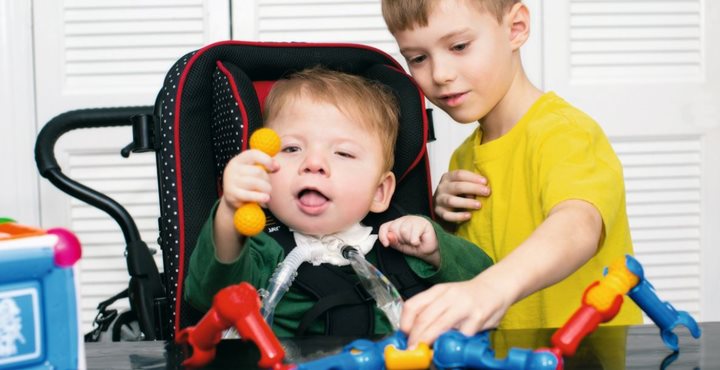Share:
Take it offline!
This Education in Motion resource is also available as a printable PDF.
Download PDF
Play is a vital part of childhood development which fosters the cognitive, social, emotional and physical wellbeing of a child. With too little stimulation, children not only begin to experience boredom, but they also lack the means to develop many core life skills. Interactive toys and games help to build many of these strengths, but not all are suited to the individual aptitudes of children with disabilities.
An important step in choosing the right toy or game for your child is to clearly identify their current skills and the skills you’d like them to develop through the play session. Activities which involve handling items will aid motor skills, while games that involve counting and sorting will help with number sense, shapes, and colour recognition. Imaginative games can be useful for interpersonal skills, and games which require movement develop gross motor skills, balance, and can also provide a good muscle workout. Different activities can offer different learning opportunities, and many incorporate practicing multiple skills into the same game.

Toys For Development
Melissa & Doug’s Ice Cream Parlour Pretend Kit
Toys which can incorporate both physical and imaginative play, offer a diverse range of uses and skill building opportunities. Melissa & Doug’s Ice Cream Parlour Pretend Kit is a favorite among many families who enjoy the versatility it lends to playtime. Children of varying abilities are able to enhance their fine motor skills as they ‘scoop’ the ice cream into cones, or develop interpersonal skills through imaginative play as they sell ice cream in their very own store.
You and your child can also have fun learning to sort the ice cream into colours or work on number sense by counting the scoops as you stack them up to see who can make the biggest ice cream cone.
The Farmers’ Market Color Sorting Set
This colourful kit will help your child develop color recognition and sorting skills as they learn and play with realistic looking produce. Easily adapted to suit the needs and abilities of the individual child, the Farmers’ Market Color Sorting Set allows for limitless versions of play. It is easy to tackle counting, sorting, matching, motor skills, and imaginative play in a single game. The set is also great for health lessons as your child learns about fruits, vegetables, and nutrition in a fun and interactive setting.
Paper Jamz Guitars
Paper Jamz Guitars are versatile toys that make learning critical thinking and fine motor skills fun for any child. The toy guitars are made from lightweight, thick paper and are able to be handled and used from any comfortable position. The guitars feature three different settings, catering to all different levels of ability.
Your child can play one of the integrated songs by strumming the body of the guitar which helps to build coordination, arm movement, and grip. They can also choose to play in ‘rhythm mode,’ making chord shapes and strumming in time with one of the inbuilt songs. This not only provides a great strengthening exercise for the arms and hands but also helps to develop hand-eye coordination and fine motor skills. The third setting is freestyle mode, where your child can use their critical thinking to create their own hit songs.

Games For Fun and Skill Development
Games and other activities can be easily modified to be inclusive of all abilities and are a wonderful way to have multiple children play together to create a bonding experience. They can be played almost anywhere, from the living room to birthday parties. Group and individual activities are an educational tool with which to build skills, relationships, strengths, and physical abilities.
Players can participate from a range of different positions to allow for independent or assisted movement, as well as to cater for the use of mobility aids. As with toys, it’s imperative to consider your child’s abilities and identify which skills to focus on throughout these activities.
Balloon Swat
Balloon Swat can be played in a group or individually, and should be set up in a place where there is no risk of damaging surrounding items. Sitting in a circle, players use a plastic fly swat to tap a balloon up into the air. Using cooperation and teamwork they must stop the balloon from touching the ground during the game. To incorporate counting, you can assign a player or assistant to keep score, adding one point each time a player misses the balloon or lets it touch the ground. The person with the lowest score at the end of the game will be the winner.
The act of swatting at the ballon improves motor skills and hand-eye coordination, and working in a team can build cooperation and social skills. Children can also be included by assigning them to referee duties, having them blow a whistle each time the balloon touches the ground to build oro-motor strength.

Bubble Wrap Race Track
Bubble Wrap Race Track is another game that can be played individually or in a group. Using chalk or tape, draw a ‘race track’ on the ground for the children to follow. For an extra satisfying pop, you can lay bubble wrap on the track in areas where it won’t be a fall risk to do so. Children are able to crawl, walk, run, or use a wheelchair or mobility scooter to make their way around the track. The challenge of the game is to get all the way around the track without going outside of the lines, which is not only fun but also beneficial for coordination, balance, and physical movement.
This game can also be used to practice following and giving directions by having the children tell each other which way to turn when they’re on the track. This improves cooperation and communication skills and also lets your child practice taking turns with others. Adults can be on hand to help out, and the track can be easily modified depending on individual abilities and access needs.
Blowing Out the Candle
Blowing Out the Candle can also be adapted to suit individual or group play, but does call for the assistance of an adult. To play, a set of 20 tea light candles are lined up on a safe, heatproof surface. Children take it in turns to blow out the candles, having three opportunities to see how many candles they blow out. This can be used to help develop number skills as you count how many candles are lit and how many have been blown out, and also is a great way to practice taking turns with others and waiting in line.
Blowing out candles helps to strengthen important oro-motor skills which control the mouth, lips, and tongue. These skills are vital in facial control as well as eating and drinking, but developing and toning these muscles can sometimes get overlooked in favor of practicing other motor skills. Not to mention, blowing out candles is fantastic fun!
Children rely on play to develop core skills and strengths and to keep their body and mind working as much as possible as they grow and learn. There are fantastic toys designed for children with disabilities, but with a little creativity, almost any toy or game can be adapted to suit individual needs. While access can be a hurdle to play and discovery at times, children with disabilities can still have many opportunities to play, learn, and build core skills with many different toys and fun activities.